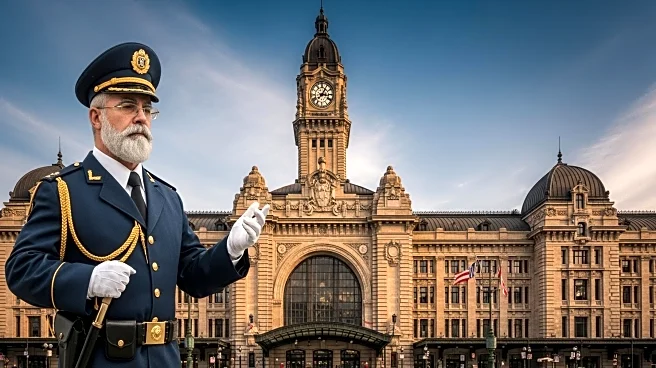What is the story about?
What's Happening?
The Trump administration has announced its decision to take over the management of Washington, DC's Union Station, a historic rail hub that has been plagued by crime and disrepair. Transportation Secretary Sean Duffy stated that reclaiming control of the station is part of a broader effort to enhance safety and aesthetics in the city. Union Station, owned by the Department of Transportation since the early 1980s, has been managed by the Union Station Redevelopment Corporation, a nonprofit organization. The decision follows a deadly shooting at the station earlier this year, highlighting ongoing safety concerns. The administration plans to collaborate with Amtrak and the USRC to improve security, lighting, and infrastructure, aiming to boost commercial income and attract private investment.
Why It's Important?
This move by the Trump administration is significant as it addresses the growing concerns over crime and safety in Washington, DC, particularly in high-traffic areas like Union Station. By taking direct control, the administration aims to implement more effective security measures and infrastructure improvements, potentially revitalizing the station and surrounding areas. This could lead to increased economic activity and investment opportunities, benefiting local businesses and commuters. The initiative also reflects broader efforts to enhance public safety and infrastructure in major urban centers, which could have implications for federal and local government collaboration on similar projects.
What's Next?
Formal action to confirm the Department of Transportation's takeover of Union Station is expected in September. The administration plans to leverage the station's commercial space to fund improvements, with anticipated reinvestment and enhanced security measures. This could unlock opportunities for private investment and potential expansion of the station. Additionally, the rollout of new high-speed Acela trains on the Northeast Corridor, which includes Union Station, is set to increase passenger capacity and speed, further enhancing the station's role as a key transportation hub.
Beyond the Headlines
The decision to take control of Union Station also highlights the ongoing debate over federal versus local management of public infrastructure. It raises questions about the effectiveness of nonprofit organizations in managing historic sites and the role of government in ensuring public safety. The initiative may set a precedent for similar actions in other cities facing crime and infrastructure challenges, potentially influencing public policy and urban development strategies.
















